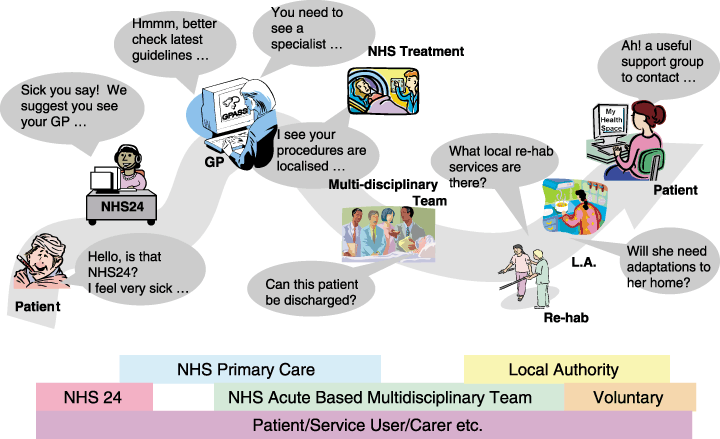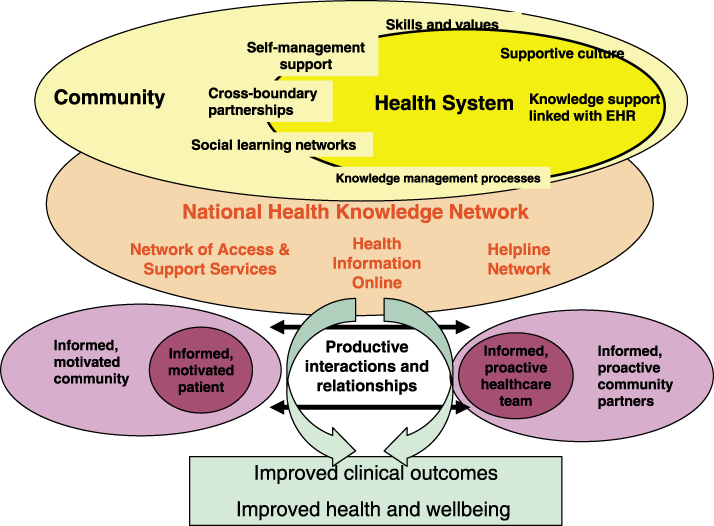A National Health Knowledge Network to support the patient journey
Vision
NHS Education for Scotland first defined its vision of a knowledge network to support the patient journey in 2004.1 This vision has served as the guiding force for national development of NHS Scotland Knowledge Services to date. It is presented here as a generic approach that may have value for other organizations defining their knowledge management strategies.
The patient journey model highlights the need for coordinated knowledge support and knowledge-sharing among the many organizations and sectors involved in caring for all aspects of the patient experience—including NHS, local authorities, voluntary sector, education (see Fig. 1). It also highlights patients and carers as key partners—not only recipients of care. The knowledge management framework based on the patient journey is holistic, encompassing the needs of the ‘patient’ in health as well as in illness; and extending the interpretation of the patient journey beyond disease episodes to the ‘cradle to the grave’ life trajectory.2–4

Partners in the knowledge network supporting the patient journey
Model
Figure 2 depicts the knowledge management model developed to support the realization of this vision, as presented in the draft coordinated national strategy for NHS Scotland knowledge services—Enabling Partnerships: sharing knowledge for patient care in NHS Scotland.3 It builds on chronic care models5 which have a similar dependency on close partnership working between patient and professional and between the health system and the wider community. Some core elements of this model have been incorporated into NHS Scotland policy commitment as outlined in the Better Health, Better Care Action Plan.5

National Health Knowledge Network (based on Chronic Care Model, IHI)
Building the National Health Knowledge Network
A knowledge network operating across multiple sectors and organizations cannot be managed in a centralized hierarchical manner. Enabling Partnerships proposes that coherence and direction can be achieved through:
1) Explicit commitment among participating services to common values, principles and strategic goals:
- •
Make knowledge available when and where it is needed in many forms, tailored to the needs of individual users.
- •
Design information services that focus on patient needs.
- •
Encourage information sharing among professionals and between professionals and patients.
- •
Build on existing services, to reduce waste and duplication and maximize benefit.
- •
Develop the information skills, values and attitudes of the people involved in improving health and caring for patients.
- •
Monitor the impact of information services on patient outcomes.
2) A common quality assurance framework applicable to all participating services. Foundations for such a framework already exist in the form of the Quality Assurance Framework for NHS Scotland Knowledge Services6 and the National Service Framework in NHS England.7
Experience to date with leadership and management of the national, cross-boundary Managed Knowledge Networks supported by NHS Education for Scotland, together with ongoing management of a portfolio of demonstrator projects for Enabling Partnerships, will help to define the governance structure needed for the National Health Knowledge Network.
Delivery channels
The consultation underpinning Enabling Partnerships highlighted three key delivery channels for the National Health Knowledge Network:
- 1)
Online network—using information-sharing tools to enable integrated and seamless access to information and learning resources from multiple providers, including NHS, local authorities, education and voluntary organizations. Individual online services managing systems tailored to the needs of their own key audiences will be able to draw upon a shared pool of content, services and tools. This online network will also support creation of an ‘NHS Google’—i.e. an integrated index providing access to quality assured resources from all Network participants.
The Online Network will not be limited to published resources, but will include access to tacit and personal knowledge and experience through online communities and social networks, and tools for creating and publishing learning resources.
This online system will provide the validated clinical knowledge content and services which can be configured to serve as clinical decision support interface for electronic health record systems, integrating knowledge with the processes of delivering patient care.
- 2)
Network of access and support points. Online information needs to be supported by a network of physical access and support points stretching across health, voluntary and local authority sectors, where all partners in care can access materials in other formats and receive support in selecting, evaluating and filtering the information retrieved.
- 3)
People networks. Consultation with a wide range of stakeholders over the past 5–6 years has underlined the importance of the human face of knowledge management—people as conduits for sharing information. Three support vehicles are proposed:
- i)
A helpline network, providing a directory or referral map of quality assured local and national helpline services, as a highly valued alternative to online information access.
- ii)
Community-building services to enable groups of patients and providers to share knowledge and experience, through managing their own online workspaces. Some communities of course can be fostered without dependency on technology; here the requirement is to provide guidance and support for the general principles of community building—leadership, communication, facilitating learning, managing information.
- iii)
Learning programmes, delivered by and for the Network, focused on;
- •
Information literacy, building skills and confidence of patients, carers and professionals in asking questions, identifying appropriate information sources, evaluating the information retrieved, communicating it to others, and putting it into practice.
- •
Defining and developing the knowledge worker role. This area of work will focus on defining and strengthening the ways in which information literacy and knowledge management form n integral part of the day to day roles and activities of health and social care staff, as well as the ‘knowledge broker’ roles found in many patient and carer communities.
The Network as a whole needs to incorporate systems for facilitating and measuring the application of knowledge to practice. This includes looking in-depth at the health information needs of excluded and hard-to-reach communities, and assessing how best to adapt or amend the system to meet these needs in full.
Conclusion
This brief overview describes key elements of a vision of a coordinated future model for healthcare knowledge services. It builds on strengths in knowledge management in existing services and technical platforms, and above all in the commitment and capabilities of the knowledge workers of all backgrounds working within health and health care.
Conflicts of interest
AW has declared no conflicts.




